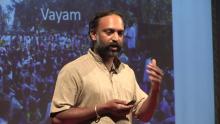The Gramsabha is an institution that received constitutional recognition in 1992 via the 73rd amendment through the Panchayat Extension to Scheduled Areas (PESA). The change that extended ‘Panchayati Raj’ to tribal areas of 10 states is now in its 26th year. Has PESA been able to empower village communities to run a village government? How have the governments fared and how did the villages respond? Has our political system - with its colonial infrastructure and desi superstructure - been able to deliver the promise of democracy to tribal villages? How does this modern-day intervention match up with the idea of village self-governance which has a much deeper history in the Indian context? Milind Thatte, activist and member of multiple constitutional bodies, will try to answer some of these questions via his experience and learnings from real-time mass-scale experiments done by the Vayam movement in villages of northern western Ghats.

Vayam Movement
Milind Thatte is the founder of the Vayam movement that works the in Palghar and Nashik districts of Maharashtra towards strengthening the Gramsabha and for community mobilisation to implement PESA, the Forest Rights Act (FRA), and the National Rural Employment Guarantee Act (NREGA). He founded the TEER (Tribal Ethos & Economics Research) Foundation in Nashik. He is the principal investigator of the National Commission for Scheduled Tribes (NCST) for the assessment of PESA and FRA implementation in Maharashtra, Madhya Pradesh, Chhattisgarh, Rajasthan, and Gujarat. He was a member of the expert committee of the Ministry of Tribal Affairs, Government of India for the formulation of community forest rights (CFR) management guidelines. Milind has been working with the scheduled tribes for the last 23 years. He has with his family lived in a remote tribal village for many years. His understanding of tribal issues is drawn straight from his living with the people.





